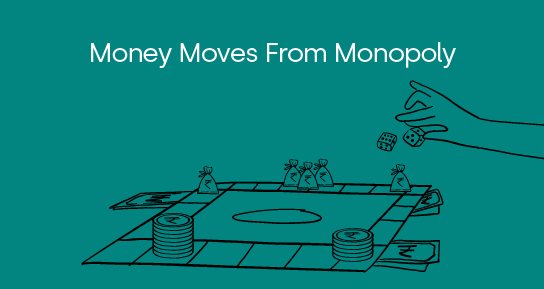Wise Up
Lessons from the Game That Bring Out the Worst in All of Us!
You know… The game that shows you your friends’ true colors, makes you reassess how sane your cousins are, and forces you to wonder how your usually calm parents can get so worked up over a board game.
We’re talking about Monopoly of course!

This simple game of buying and building your assets can seriously contribute to trauma – but, it can also teach a number of valuable lessons to players – if you are willing to learn! Today, we thought we’d round up some lessons from Monopoly that can find a use case in your own investment journey –
- Killer Focus – One of our teammates’ goal in the game isn’t to win it, but to only and solely acquire Mayfair and Park Lane – the two most expensive properties on the board. He will do whatever it takes to get these properties – he will try to sneak into the bank, try to trade for it, or even let go of some other interesting properties to make sure he has enough money to buy the two he really wants. 9 out of 10 times he will get those properties, and as soon as he builds on any of them, he is just robbing other players through his rent! Monopoly, when played with such conviction, can illustrate the importance of focus when spending money. Set a goal – work for it – achieve it – sit back and let it reap you juicy rewards.
- Losses Are a Part of the Game – In Monopoly, and in life, loss is inevitable. But in the same way that you can mitigate loss in Monopoly (by investing in Utilities or Stations that give out steady rent), you can also mitigate your losses in real life by investing in a diverse portfolio. It teaches you to not put all your eggs in one basket, and create sources of financial security for yourselves early on in the journey.
- No Room for Emotions – Okay no. Sorry. We misspoke. There are a lot of emotions in Monopoly. This isn’t a learning. More of a realization.
- Patience is a Strategy – You have to be patient when it comes to money – whether that’s in a board game or in real life. In Monopoly, sometimes you’ll find that you have to go through 2 rounds without any spending, so you can collect the 200 you get when you pass ‘Go’. Trying to get all 4 Station tiles is a strategy that maximizes their earning potential. There is also a strategy involved in where you want to build a house and when. The key to using your money wisely lies in creating a strategy that aligns with your goals.
- Expensive Doesn’t Necessarily Mean Lucrative – Let’s go back to point #1. If you are one of these people who want Mayfair and Park Lane, come hell or high water – then this one’s for you. Expensive properties will yield the best returns – yes. But you have to ask yourself some important questions. ‘Is this worth me going bankrupt for?’ ‘For the same amount, can I get 6 properties instead?’ ‘What if I build a house on Park Lane, and nobody lands on it?’ The answers to these questions will disclose how risky an expensive investment might be. The lesson to keep in mind here is that if you are buying something expensive (or investing in something promising high rewards!), you are also likely exposing yourself to more risk.
- Set Up Continuous Inflow – This is a simple one. The more properties you have, the more rent you are able to gather. Sometimes it makes sense to not focus so much on the colors of the cards, and just buy whatever you can when you can. In the game, this can also be particularly delightful since you can use this strategy to make sure that others aren’t able to build anything either, and the mandatory, no-rule-having process of internal trading can begin! But in real life, it goes without saying that setting up multiple streams of income can be highly lucrative!
- Cash Isn’t King – At the end of the game, when it comes to deciding who has won, you might think that the person with the most cash will be the obvious winner. But, in reality, the total cost of all your properties, buildings, and cast is accounted for to assess your net worth, and the person with the highest net worth wins. This holds true in real life off the board as well. Physical currency isn’t your only monetary asset. Rather, it is a combination of your savings, investments, and subsidiary incomes.
Of course, the game of Monopoly is, at the end of the day, a game. So all its learnings need to be considered with a pinch of salt – but all in all – there are some solid financial lessons in there! What do you think?
(We think we’ve gotta play another round to reaffirm everything mentioned above!)

